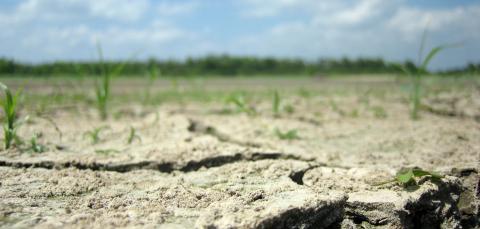Climate change poses one of the greatest risks to future food production both in the UK and globally. Around 72% (17.5 million hectares) of the UK land area is farmed, with 37% of this as productive arable land. In 2017, the UK agriculture sector employed 419,000 people directly and generated Gross Value Added of £10.3 billion each year. The general consensus is that climate change will have both significant positive and negative impacts on UK agriculture, and these will vary depending on geographic region. Climate-related impacts may occur through gradual, long-term change, or as a result of more rapid and stochastic changes triggered by extreme weather events, such as droughts and wet winters. In the short- to medium-term, we expect the growth of certain crops, such as maize, to benefit from longer growing seasons and higher temperatures. However, in the longer-term, changing patterns of rainfall, increased evaporation and reduced water availability will all threaten crop production. Similarly, increasingly wet autumns will constrain agricultural production by adversely affecting the timing of farming operations. These could indirectly result in environmental damage, such as soil compaction and erosion. However, considerable uncertainty remains as to the location and severity of these impacts, and the rate of recovery following perturbations.
It remains a research major challenge to disaggregate the impacts of climate change on crop production from many other technological and socio-economic factors affecting yield. This uncertainty and a lack of knowledge have left the UK agricultural sector poorly prepared for a future, changing climate. An indication of this was provided by the significant impact of the 2018 summer drought on yields of many major crops. BBSRC and NERC are currently funding a large national capability research programme “Achieving Sustainable Agricultural Systems, ASSIST” (https://assist.ceh.ac.uk/), with strong support from the farming industry. As part of this programme, the Centre for Ecology & Hydrology has assembled a strong multi- and inter-disciplinary team to develop and test new farming systems. Building on ASSIST, the CROP-NET project aims to scope out the requirements for a robust, real-time crop and grass yield monitoring and modelling service for the UK to provide improved predictions of future climate change impacts. Specifically, we will explore: 1) the feasibility of using Earth Observation data in combination with large volumes of precision yield data collected by the farming industry to provide early warning detection of climate-related risks to crop yields across the UK; 2) the use of fine-scale projections of UK climate under UKCP18 to target locations across the UK that represent the full range of climate change scenarios over the next 30-40 years. This process will consider different climate variables (e.g. temperature, precipitation) at different temporal resolutions (e.g. average summer temperature, drought periods, and heat peaks) that are likely to affect crop growth and yield. In this way, the monitoring of yield will provide data to pick apart the different process by which climate change will affect yields; 3) the key social and economic factors affecting farmer perception of climate change threats, and their willingness and ability to adapt their farming systems in response to this; and 4) the viability of using data from an established, real-time crop yield monitoring network to improve the predictive power of crop growth models to build a demonstrator prediction service, and therefore inform climate adaptation strategies for crop production.
Demonstrator
Online CROP-NET demonstrator tool: https://cropnet-demonstrator.datalabs.ceh.ac.uk/
Publications
- Wheeler, R., Lobley, M., 2021. Managing extreme weather and climate change in UK agriculture: Impacts, attitudes and action among farmers and stakeholders. Climate Risk Management, 100313
Videos
How farmers can adapt to climate change? – UK Centre for Ecology & Hydrology
Webinar: 17 June 2021: Crop-NET: Monitoring and predicting the effects of climate change on crop yields with Professor Richard Pywell.

